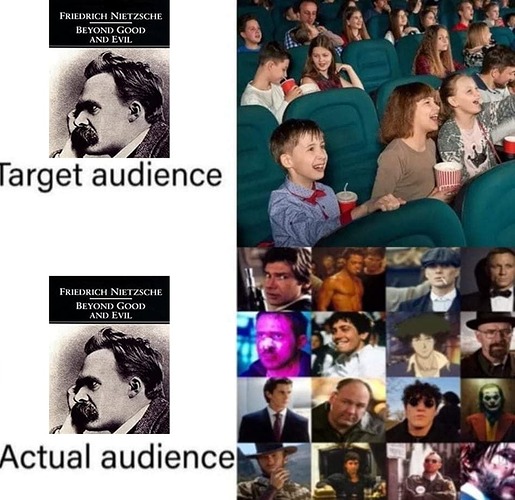This might be my favourite meme I made this year.
I had been thinking about a more productive and interesting response to the exhausting edgy gamer talking points about gamer identity. The typical response from people who disagree with gamergate moat and bailey positions are basically embarrassing to watch, and reminiscent of typical responses to the "the left can't meme" meme (namely, attempting to prove that, "nooo, girls are gamers"; or that, "nooo, the left can meme"; thereby legitimising and perpetuating the moronic framing that should simply be disregarded entirely).
Basically, the meme is a metaironic response to gamergate logic: it simultaneously mocks the ironic veil of gamer identity and the preironic responses that gamer trolls elicit from their targets. Instead, it inverts the same sexual stereotype usually reserved for women and points out the way that it also applies to men.
The result is that the frame of debate is shifted to whether even men themselves tend to meet the arbitrarily demanding standards for being "real gamers". It's a far more productive topic of debate, since mere recognition and engagement with this meme already makes a novel point. The new framing encourages new questions, such as "what is so important about meeting the standards of being a 'Real Gamer' that we're waging culture wars?" as well as highlighting that many of the more essential positions in said culture wars are usually left unspoken.
It's not especially sophisticated as a meme in and of itself, but I'm pretty happy with the response the meme received: there was a lot of dudes getting angry in the comments on the page post trying to "prove" that the meme isn't true and that "nooo, men do game!" (note: this is what leftists look like when they take the bait on an accusatory meme like "the left can't meme"). Even the stoic, Chad "Yes." response falls flat against this kind of meme whose most important function is to reframe the discourse rather than to make a direct point.
Here's another meme I made with the same technique:
It's an anti-Nietzschean meme that similarly attacks Nietzscheans, by suggesting that:
- Nietzsche's work was intended for juvenile minds;
- Those who think otherwise are mistaken, in a rather pathetic sort of way; and that,
- Nietzscheans are the philosophical equivalent of "kidults" indulging a little too seriously in media intended for children (an act typically disdained by edgy Nietzscheans, most of whom seldom read).
Some kneejerk reactions that can be expected of defensive Nietzscheans are to:
- Dismiss the meme as "ressentiment" or "slave morality" or whatever Nietzschean buzzword;
- Attempt to defeat the meme by, say, swapping panels 2 and 4 (this doesn't work; it's already the point that the meme is making metaironically) or copy-pasting panel 4 into panel 2 (this is cringe and would also prove the point of the meme);
- Argue against the meme by making some claim or another to the point that, "nooo, Nietzsche was based and his work is meant only for special and hyperintellectual minds."
Again, engagement and recognition is already a success for the meme, since it shifts the frame of the discourse to something more productive than the sort that Nietzscheans who don't read or understand Nietzsche can really handle: namely, that Nietzscheans usually don't understand Nietzsche (or hermeneutics, or irony, and so on), yet nonetheless think themselves aspiring ubermensch.
The limitations of the above two memes are actually proportionate to their advantages. Its metaironic formulation makes it hard to develop constructive discussions around it as a foundation for community, whereas postironic memes excel at precisely this task. Indeed, communities founded primarily on the metaironic strategy (e.g. esoteric right-wing Twitter spinoffs) turn out rather hollow upon closer inspection, no matter how much hype and other signals of a serious movement (namely, reach and money) get involved.
The usefulness of metaironic memes comes primarily from spreading them into foreign contexts where they can elicit upset and highlight some inconsistency in a way of thinking, which might change an opponent's mind or embolden an ally. That's the dominant strategy at the moment, and it seems to work very well for what it's worth, within limits. I think that what we should aim for is metairony in the streets, postirony in the sheets.


